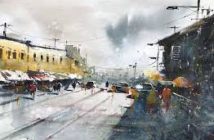Dear Artist,
Behavioural scientist Winifred Gallagher, in Rapt: Attention and the Focused Life, suggests our lives are formed by the attention we give to something, rather than by fate, circumstance, fortune or even chaos. But what happens in those exceptional moments, when our bearings are lost and we enter a period of temporal, emotional or physical disorder? We may let our focus wander, disarmed — a humble, inverted feather on the wind. Could disorientation serve as an opportunity to re-assess and revisit life’s tabula rasa?
If grief’s void allows us the space to re-dream, we may imagine more beneficial systems, including helpful thoughts about work and our motivations — how to draw upon the highest in ourselves for maximum integrity in our ideas and production.
Here are a few ideas:
1. Take time to dwell in a world where expectations are mutable and prejudices quiet.
2. Visualize the “slump that looms” as a dream-period with a swift transition to a non-precious do-period.
3. Remove three items in your toolbox you depend on. Replace them (temporarily) with three items that have historically received your hostility.
4. Select one quality you’re set upon and “try on” the idea of its opposite. For example, “I’m a procrastinator” becomes “I break big concepts into fast, mini-projects. I’m a completer.” Another example: “I feel things deeply; I’m not sure what to do next” becomes “My ability to feel allows me to serve; I create meaning through art.”
5. Ask yourself, again, “What can be?”
“Once out of your cradle, you don’t focus on the world in the abstract, perceiving things for the first time, but in synchrony with your accumulated knowledge, which enriches and helps define your experience, as well as ensuring its uniqueness,” says Gallagher. But both our baby eyes and accumulated wisdom can function in concert to take us ever farther in our communication, expression and originality. In the midst of what can feel like a capsizing, we take a dip in a cleansing sea, and re-emerge a more empowered sailor.
Sincerely,
Sara
PS: “Perfectly ordered disorder designed with a helter-skelter magnificence.” (Emily Carr)
Esoterica: The exact region of the brain involved in orientation remains unplotted, but studies show that lesions on the cerebral hemispheres and brain stem have been reported to cause disorientation. Dehydration and lack of oxygen can also disable our sense of time, location, and our recognition of people, places and things. Most of us, presumably, are not in the habit of stumbling around in our studios, but we might appreciate the gentle nudges of a topsy-turvy interlude. “Whenever you think you can or think you can’t, either way you are right.” (Henry Ford)
“Learn the order of things so you can unlearn the order of things and fly free.” (Louise Cork)
[fbcomments url=”http://clicks.robertgenn.com/disorientation.php”]
Workshop Feature: Alan Flattmann

You may be interested to know that artists from every state in the USA, every province in Canada, and at least 115 countries worldwide have visited these pages since January 1, 2013.


architectural illusions by Regina Silveira, São Paulo, Brazil |
Share.





